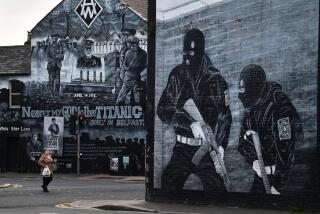Northern Ireland
- Share via
* Having spent considerable time researching Michael Collins, I can perhaps answer the question raised by Michael Elliott’s “Can the IRA Leave its Myths Behind?” (July 27). No! The IRA killed Collins in 1922 when he supported peace, democracy and prosperity in spite of the fact that the island was partitioned, in opposition to the IRA’s defining myths linking Ireland’s identity to a militant nationalism coupled with socialism.
What Elliott fails to mention is that similar myths are observed by Ulster’s Protestant paramilitaries. Until the obsession with social identity is put aside, as urged by Collins, any peace agreement will be meaningless.
LEONARD WURTHMAN
West Hills
* Elliott’s essay indulges in a few myths of its own. Most striking is the suggestion that the fact of industry in the north and agriculture in the south reflects a distinction between the progressive outlook of Scottish settlers and some lack of vision in the original Catholic population.
During the so-called Protestant Ascendancy, any significant economic decision resulted from English interests, since it was a condition of inheritance that a family be Anglican rather than Catholic. In both shipbuilding and linen manufacturing, Irish Catholics, dispossessed from ancestral holdings, made up a labor force exploited by the English. Neither industry is as significant today, and it is part of the harsh reality of the north that loyalist mob violence, with its constant overtones of ethnic cleansing, reflects the fears of those who have already lost their former economic status and now fear a loss of an artificial political status as well.
Is it not ironic that these descendants of transplanted Scots cling to an English identity at the same time that their cousins in Scotland are pressing for greater autonomy?
DOUGLASS McFERRAN
Woodland Hills


